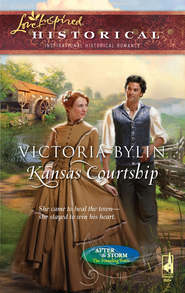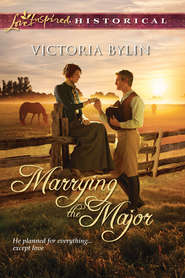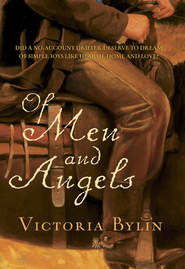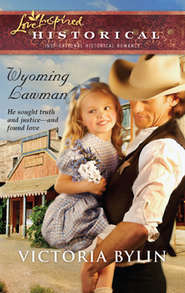По всем вопросам обращайтесь на: info@litportal.ru
(©) 2003-2024.
✖
The Outlaw's Return
Настройки чтения
Размер шрифта
Высота строк
Поля
Chapter Fourteen
Chapter Fifteen
Chapter Sixteen
Chapter Seventeen
Chapter Eighteen
Chapter Nineteen
Chapter Twenty
Chapter Twenty-One
Chapter Twenty-Two
Chapter Twenty-Three
Epilogue
Letter to Reader
Questions for Discussion
Chapter One
Denver, Colorado
July 1876
When J. T. Quinn vowed to find Mary Larue, he never once imagined they’d meet on a perfect Sunday morning in Denver. On those long nights when he’d lain alone in his bedroll, he’d imagined seeing her on a stage in some high-class opera house. He’d pictured himself in a black suit and a white shirt leaning against the back wall with his arms crossed as he listened to her hit the high note only she could hit. Their eyes would meet and she’d recognize him. She’d miss a beat, but she’d pick up the song with even more power than before and he’d know…she still loved him.
That wasn’t going to happen today.
It wasn’t Saturday night, and J.T. wasn’t wearing a suit.
It was Sunday morning, and he had trail dust in every pore. He also smelled like the inside of a saloon. He hadn’t visited such an establishment for six months, but last night he’d walked past a gaming hall with a head full of memories. A drunken cowhand had stumbled out to the boardwalk with an open bottle of whiskey, and the contents had sloshed on J.T.’s trousers. The smell had sickened him in one breath and tempted him in the next. He’d have changed clothes, but the garments in his saddlebag were filthy. They stank, but not with whiskey. He’d resisted that temptation, and he’d done it because of his love for Mary Larue.
Heaving a sigh, he looked down at his dog. “What should we do, Fancy Girl?”
She whapped her tail against the boardwalk and looked up at him with her tongue lolling out the side of her mouth. J.T. didn’t know what kind of dog she was, but they’d been best friends since he’d walked out on Griff Lassen at the Dudley place. They’d been running off Ambrose Dudley and his brother, squatters up in Wyoming, when the dog had charged at them and started barking. Griff had ordered J.T. to shoot her dead.
J.T. had done a lot of mean things in his life, but not even he could shoot a dog. On the other hand, he’d come close to shooting Griff. When the man aimed his Sharps at the mutt, J.T. had shoved the barrel downward. The bullet had ricocheted off a rock and creased Fancy Girl’s head. J.T. had mopped her blood with his bandanna and fed her jerky from his pocket. When she’d followed him to his horse, he’d poured water from his canteen into a pot. She’d lapped every drop, and he’d filled it again.
He’d left the Dudley place with the job undone and Griff promising to get even, but the dog had followed him. That night he’d named her Fancy Girl because her fur reminded him of Mary’s blond hair, and he’d made a decision. He didn’t want to be the kind of man who hunted squatters and shot at dogs.
Over the past ten years, J.T. had sold his gun for money. He’d been nineteen when he’d first been paid to hunt down cattle rustlers, and next month he’d turn thirty. For a gunslinger, he had a lot of years on him. Today, standing outside a saloon and listening to Mary sing, he thought back on those years. He’d drunk oceans of whiskey and been with too many women. The whiskey had never failed to work its magic. The women, though, had lost that power, and it was because of Mary.
She’d been in his head for two years now, ever since Kansas, where they’d been a pair and she’d made him smile. Really smile. Not the sneer he usually wore. And not because she was generous with her affections. Mary made him smile because she believed he was a good man. He wasn’t, but after the mess at the Dudley place, he wanted to try. Leaving that day with Fancy Girl, he’d decided to find Mary and make a new life. He had some money saved, enough to open a saloon, a place where she could sing and live the life she’d always wanted. He didn’t plan to marry her. He’d changed, but not that much. Picking up where they’d left off seemed noble enough.
He and Fancy Girl had been searching for six months, and he’d finally caught a break. He hadn’t touched a woman or a drop of whiskey since the mess in Wyoming, but he still had to eat. Last night he’d taken supper at the boardinghouse where he was staying with his dog. One of the boarders, an old man with bad eyes, had told him about a woman named Mary who sang like a nightingale.
You’ll find her tomorrow morning at Brick’s Saloon.
Not once had it occurred to J.T. that Mary would be singing a hymn in a makeshift church. His mind had gone in the opposite direction. He’d imagined her finishing up a night’s work that involved more than singing. He’d been sick to think she’d fallen so low, but in the next breath he’d been relieved. No matter what Mary had done to survive, he still loved her. He wouldn’t wish her the suffering of selling herself, but he rather enjoyed the thought of riding to her rescue. He didn’t have much to offer a woman as beautiful and talented as Mary Larue, but he had plenty to give to a woman forced into prostitution. As a gunslinger, J.T. knew all about selling himself.
Mary’s voice soared to a high note of a hymn. With that glorious sound, J.T.’s hopes crashed like a bird dying in flight. What did he have to give a woman who sang in church? Not a blessed thing. He didn’t believe in God. The one time he’d cried out for mercy, the heavens had remained silent, and he had the scar to prove it.
Fancy Girl whined at his side.
“I know,” he said. “We found her, but it’s not going to work.”
Inside the saloon, Mary’s voice dipped and soared. As the hymn closed with a trembling “amen,” Fancy Girl tilted her head. He could see where the bullet had left a lightning bolt between her ears. The dog had a keen intelligence and a way of reflecting J.T.’s thoughts. When she cocked her head, he saw the question he’d just asked himself.
“She doesn’t need us, girl.”
Fancy wagged her tail. But you need her.
“I know.” He rubbed the dog’s chin. “But she’s happy now. She’s got more than I can give her.” He had a lot to offer a fallen woman, but a respectable one was beyond his reach. For all he knew, Mary could have found a husband. Did she have a baby of her own? Maybe a house with pretty curtains? J.T. didn’t know, but he knew Mary had changed. The old Mary wouldn’t have been caught dead singing a hymn. The new Mary sang the song with conviction.
If she’d been the woman he recalled, J.T. would have fought for her affection, but how could a man like him compete with God? J.T. certainly couldn’t, though he could have given the devil a run for his money. The thought offered an old and lonely consolation. If he couldn’t have Mary, why not buy a bottle of whiskey, a big one with a fancy label? Why not get drunk and sink into oblivion? J.T. fought the urge to go down that road, but he felt his grip slipping. Without Mary, he’d cleaned up his life for nothing. Finding a place to buy liquor on a Sunday morning wouldn’t be easy, but he’d seen a mercantile that probably had a stash behind the counter.
He stopped scratching Fancy Girl’s ears. “Let’s go,” he said to the dog.
She barked.
“Shhh,” J.T. cautioned. The last thing he wanted was a nosy minister poking his head over the batwing doors. He took a couple of steps down the boardwalk, but the dog didn’t budge. Instead of following him like she always did, she whined.
“I know how you feel,” he said. “But we’re not good enough for her.” A man couldn’t turn a sow’s ear into a silk purse, and J.T. was definitely closer to a pig than fine fabric.
When the hymn ended, the minister called out, “Amen!”
Chairs shuffled and a woman called to the crowd. “We’ve got pie and coffee. Help yourselves, folks.”
J.T. had skipped breakfast, and he had a sweet tooth these days. Pie sounded good, but he had to go before the church folks started to leave. He aimed his chin across the street. “Come on, Fancy.”
The dog perked her ears and tilted her head. J.T. considered the expression a smile, mostly because she got that look when he told her stories by a campfire. He did it to amuse himself, but mostly he liked the way Fancy seemed to listen. She had that look now. She seemed pleased, even eager to go inside the saloon, as if she expected a big bowl of water, maybe even a meal of scraps.
That’s one thing J.T. could say for his dog. Fancy Girl had hope. J.T. had no such optimism. Mary had found a life better than anything he had to give. He had to leave before someone noticed him. “Come on,” he repeated firmly to his dog.
The mutt looked at him as if he were an idiot, then she walked under the batwing doors with her tail wagging.
“Traitor,” J.T. muttered.
Thoroughly annoyed, he leaned against the wall of the saloon, placing himself between the window where he’d peeked inside and seen Mary and the door that would put him directly in her line of sight. No way could he go inside, but neither could he leave his dog.
Surely a high-and-mighty minister would throw the mutt into the street. J.T. just had to wait for someone to notice her. Squinting against the sun, he leaned on the wall and crossed his arms. As soon as Fancy Girl learned her lesson, he’d throw away six months of hope. He’d find a place to buy whiskey, then he’d get his horses out of the livery and he’d leave Denver fast and forever. He’d find a tree by a stream, drink the whole bottle and push Mary Larue out of his heart forever. First, though, he had to get his dog back.











